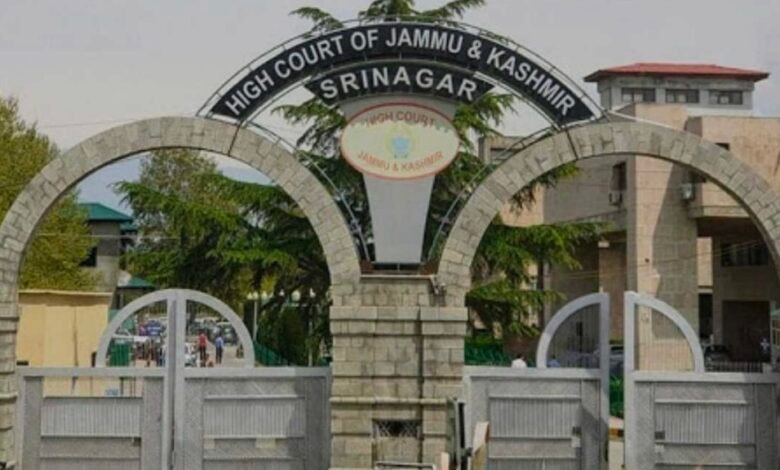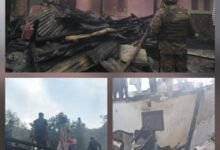J&K High Court Convicts Former SHO to Life Imprisonment in 2003 Fidayeen Attack Case

Iqbal wani
Srinagar, August 31, 2025 – In a significant ruling, the High Court of Jammu & Kashmir and Ladakh has partially allowed a state appeal, convicting a former police Station House Officer (SHO) to life imprisonment for his role in a deadly fidayeen attack in Kupwara district over two decades ago. The court upheld the acquittal of a second accused, marking a mixed outcome in a case that has lingered in the judicial system since 2011.
The division bench, comprising Justice Sanjeev Kumar and Justice Sanjay Parihar, delivered the judgment on August 30, 2025, overturning the trial court’s acquittal of Ghulam Rasool Wani, the then-SHO of Police Station Sogam. Wani was found guilty of criminal conspiracy under Section 120-B read with Section 302 of the Ranbir Penal Code (RPC), equivalent to murder, for aiding a Pakistani militant in carrying out the attack. He has been sentenced to life imprisonment and ordered to surrender to the trial court for formal sentencing and custody.
The case stems from a fidayeen (suicide) attack on May 12, 2003, near the State Bank of India branch in Kupwara’s main chowk. The Pakistani Terrorist, identified as Mohammad Ibrahim alias Khalil-Ullah from Muzaffargarh, Punjab, Pakistan—a member of the Jaish-e-Mohammad Terrorist outfit — opened indiscriminate fire on security forces, killing two Central Reserve Police Force (CRPF) personnel from the 113th Battalion: Constable B. Prashad (No. 931130457) and Constable B. Ramaiah (No. 880909346). Six others, including police and CRPF jawans, were injured in the gunfire and subsequent grenade explosion.
State was represented by Adv Bikram Deep Singh, Deputy Advocate General
According to the prosecution, Ibrahim, disguised in a police uniform bearing belt number 1260-KP, was ferried from Sogam Police Station to the attack site in an official police vehicle (Tata 407) by Wani and his co-accused, Abdul Ahad Rather, the station’s Moharir (record keeper). Witnesses, including police constables who traveled in the vehicle, testified that Ibrahim posed as a member of the Special Operations Group (SOG) from Lalpora. The militant was neutralized at the scene after a grenade he lobbed rebounded and exploded, disfiguring his head. Recovered items included an AK-47 rifle, six magazines, 43 rounds, and four hand grenades.
The Sessions Court in Kupwara acquitted both Wani and Rather on January 28, 2011, citing inconsistencies in witness testimonies and insufficient evidence linking them to the conspiracy. The state challenged this verdict, arguing that the trial court had ignored credible evidence from key witnesses, including police personnel who described Wani’s suspicious interactions with the militant.
In its 30-page judgment, the High Court criticized the trial court’s approach as “perverse” and “erroneous,” particularly for dismissing the testimonies of prosecution witnesses PW-32 (Constable Ayaz Ahmad), PW-33 (Constable Riyaz Ahmad), and others. The bench noted that Wani, as SHO, had full knowledge of Ibrahim’s militant affiliations and objectives but “tacitly consented” to the attack, allowing the militant to “play havoc” despite his duty to protect lives. The court drew parallels to firing a loaded cannon into a crowd, emphasizing intent to cause death under Section 300 RPC.
However, the court found no substantial evidence against Rather, describing the case against him as “hypothetical” and lacking proof. His acquittal was upheld, with the bench concurring that mere knowledge of a uniform’s availability (from an absent constable) did not establish conspiracy.
Proceedings against Ibrahim had abated due to his death during the attack.
Wani, who remained in preventive detention post-acquittal before being released, must now serve life imprisonment. The court directed that a copy of the judgment be sent to the trial court for compliance.
This case also references prior killings in the area, including that of former law minister Mushtaq Ahmad Lone and his brother, in which the accused were allegedly involved, though not directly charged here.





